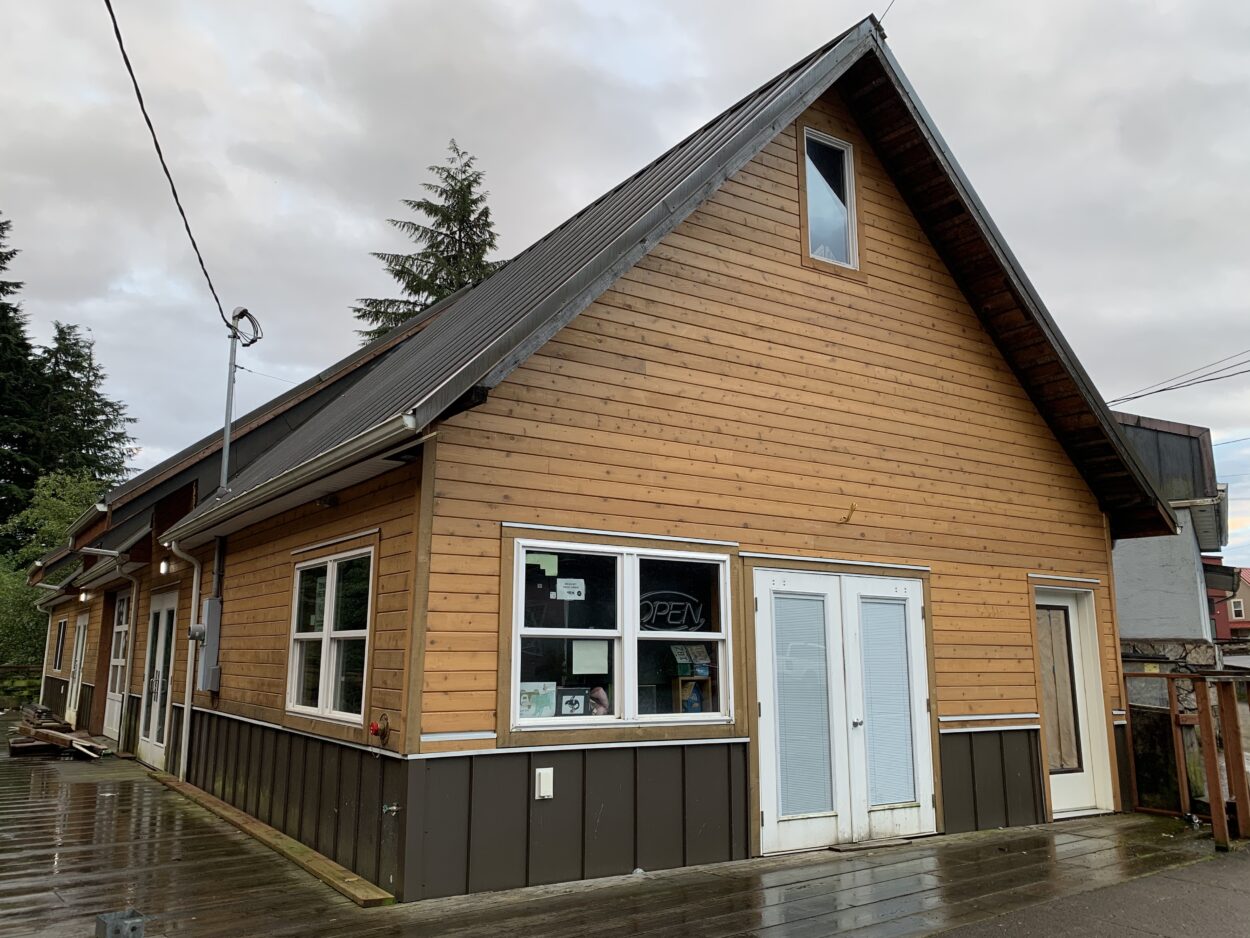
On an unusually sunny Ketchikan morning, CEO of First City Homeless Services, Deborah Asper, propped open the door to the shelter’s kitchen.
“So we serve two hot meals a day,” Asper said. “And then on Saturday we also provide a brown bag lunch.”
As part of their skill-building program, Asper said participants can earn points by helping with things like cleaning laundry, and then spend those points in the shelter store.
“Let’s say they miss breakfast, and they come down. They’re like, ‘Well, I’m really hungry.’” Asper explained. “And we say, ‘Okay, well, you have 300 points’ And they’re like, ‘Okay,’ so they go to the store, and they say, ‘I want to eat this, and I want to eat this.’ And we say ‘Great, that’s 60 points, you can afford that.’ They take it and then they have food.”
Asper said the program has taken off and participants now do most of the cleaning and have a sense of ownership over the shelter. She said it’s programs like this that help people build the skills they need to become self-sufficient — skills that they either were never taught or that they abandoned in favor of survival instincts to live on the street.
In addition to the skill-building program, First City offers basic needs services like showers, first aid, and peer support. And they work with community partners to provide church services and Alcoholics Anonymous and Narcotics Anonymous.
But the shelter location is less than ideal.
Before the summer of 2022, it operated out of a church basement and closed its doors for several hours a day.
Then the city of Ketchikan asked the organization to start providing 24/7 service. Asper said they offered up the Park Avenue building.
“And they said, ‘Well, if you do this, then we will give you a building to operate out of, because of the fact that you’re going to be growing,’’’ Asper said. “So we accepted and we moved down here. And it became apparent very quickly that moving a low-barrier shelter into a residential area was not the best decision.”
She said the downtown location is helpful being near the people they need to serve, but it has created tension with nearby residents and businesses. That tension came to a head at the March 21 City Council meeting.
The shelter building’s lease was due to expire in April, and several Council members were unwilling to extend it. Members like Judy Zenge said they felt responsible for creating a strain on the community.
“I’m really tired of us ignoring the business people. These are people who pay property taxes, collect sales taxes. We seem to ignore them,” Zenge said. “For me, we’re not denying [First City Homeless Services] a shelter, we’re just terminating our lease. They can still go and rent another facility.”
In fact, First City Homeless Services is already in contract for a new facility: the old VFW building, a couple miles north of the downtown area and across the street from PeaceHealth Medical Center.
But Asper said the property will cost about $2.7 million to purchase and renovate, so they’re currently trying to secure grant funding, which is a slow process.
“We aren’t applying for $100,000, right, we’re applying for — I submitted a grant for $1.9 million,” Asper said. “So the process of that is tedious, and it takes a lot of time.”
She said the new building likely won’t be ready until the end of 2025. If they’re forced to vacate Park Avenue before then, she said they’ll have to stop providing 24/7 services.
“There aren’t currently any locations that we can move into for 24-hour facilities that wouldn’t require some type of renovations,” Asper said.
In light of that, City Manager Delilah Walsh submitted a written recommendation to the Council that they extend the lease for two years, with a provision that it would not be renewed again after that. Her memo included written testimony from the city Police and Fire Departments, who both said the city’s homeless problem would worsen if the shelter was closed.
That sentiment was echoed during the Council meeting by member Jack Finnegan. He said without a backup plan, closing the shelter would only heighten the strain on the community.
“The situation becomes better for nobody. It becomes better for none of the businesses, it becomes better for none of the residents, because these people are not just going to be wished away, they’re not going to vanish,” Finnegan said. “They’re still going to need a place to sleep, they’re still going to need to eat, they’re still going to need to relieve themselves.”
That need to relieve themselves is one that came up multiple times, with Council members citing local businesses’ complaints of defecation on their property.
Finnegan also pointed out that the people using the shelter’s services are community members like everyone else.
“It’s very easy to dehumanize people that are suffering these terrible circumstances,” Finnegan said. “It’s not that they’re criminal. But people in desperate situations will do what they can to survive.”
Council member Zenge said she appreciated Finnegan’s comments, but that the city made a mistake in giving the shelter that building, so she simply couldn’t support extending their lease.
“I mean, the way you’re coming across to me makes me feel like, well, we’re bad people. Listen. We represent the entire community, not just that little segment of population that’s homeless,” Zenge said. “We have to think about everybody. And I don’t think we’ve been fair to those other folks, I really don’t. I don’t think we’ve been fair to the residents, to the children, to the businesses.”
Ultimately, the Council settled on a compromise: a month-to-month extension through July 31, 2024. The vote passed 4-3, with members Finnegan, Gage, Kistler, and Flora voting in favor, and Gass, Mahtani, and Zenge voting no.





